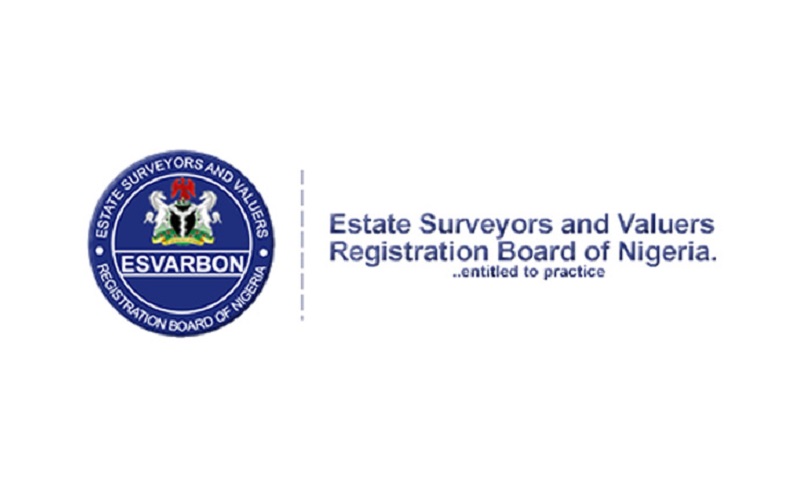General
FG Tasks ESVARBON on Effective, Affordable Housing Operations

By Adedapo Adesanya
The federal government has tasked the newly inaugurated Estate Surveyors and Valuers’ Registration Board of Nigeria (ESVARBON) to carry out effective and affordable housing operations that help alleviate the issue in the country.
The Minister of Housing and Urban Development, Mr Ahmed Dangiwa, disclosed this on Tuesday while inaugurating the 22-member professional body in Abuja.
He said that it was necessary due to the expiration of terms of several of the board members, which has led to a shortage of active members.
He said that the board had been unable to meet the quorum of 11 members required by the Estate Surveyors and Valuers Registration Act.
According to him, although a new chairman was appointed after the former chairman’s term ended on March 17, the terms of 15 other members have also expired, further contributing to its to function effectively.
“There are five appointees from five states, four from four institutions, three on the minister’s representation, and two from the Institute of Estate Surveyors and Valuers, while the nomination from Oyo State is being awaited.
“It is important to note that the board is an essential organ charged with the duty of overseeing the profession of estate surveying and valuation in Nigeria.
“President Bola Tinubu has mandated the Federal Ministry of Housing and Urban Development to transform the housing sector for the actualisation of the Renewed Hope Agenda.
“Therefore, all agencies, institutions, and parastatals under the ministry must be alive to their responsibilities and work hard towards achieving the objectives for which they were set up,’’ he said.
Mr Dangiwa also said that estate surveyors and valuers played an important role in the successful delivery of affordable housing across Nigeria.
He noted that their professional expertise ensured that land and property valuations were accurate and reflected fair market values crucial for facilitating cost-effective housing solutions.
“Furthermore, estate surveyors contribute significantly to urban planning and development.
“They help to ensure that housing projects are well-structured, financially viable, and sustainable. By working closely with developers, they help to optimise resources, making housing more affordable for Nigerians.
“In addition to their role in housing delivery, estate surveyors are critical in preventing building collapses, which this ministry aims to address.
“They do that by ensuring that property inspections and assessments are thorough and in accordance with professional standards,’’ he said.
The minister urged the ESVARBON board to focus on its mandates which include determining who qualifies as estate surveyors and valuers.
He said that the mandate also included establishing the required standards of knowledge and skill for those seeking registration, and maintaining a register of qualified persons and publishing the list periodically.
He added that ESVARBON was tasked with regulating and controlling the practice of estate surveying and valuation, and performing other functions as conferred by the Act.
He, therefore, charged the board to promote excellence in estate surveying and valuation, uphold the integrity of the profession, foster collaboration and knowledge sharing and advance the interests of members and the public.
On his part, the chairman of the board, Mr Dosu Fatokun, said that with its reconstitution, ESVARBON would continue its vital role of regulating and controlling the practice of the profession to ensure integrity, professionalism and transparency.
“I assure the minister that under my watch, ESVARBON will live up to the expectation of the Federal Government and the public in general,’’ he said.
He said the board would strengthen its regulatory framework, promote innovation, technology and professionalism, folster collaboration, and contribute to the renewed hope housing agenda.
He requested that members of the board should be appointed as facility managers to professionally handle the post-development issues relating to housing estates and cities.
“These include disposal by sale, lease or balloting as well as establishing a facility management model for the new stock of infrastructure.
“A usual derogatory refrain is that Nigeria lacks maintenance culture. The nation’s sizeable public infrastructure is under the Federal Ministry of Housing and Urban Development.
“The board offers to partner with the ministry and other built environment professionals to fashion out appropriate maintenance model to improve our infrastructure repairs and upkeep culture in the country.’’
General
INEC Shifts 2027 Presidential, N’Assembly Elections to January 16

By Adedapo Adesanya
Nigeria will hold next year’s presidential and National Assembly elections a month earlier than planned, after the Independent National Electoral Commission (INEC) revised the polling schedule.
The elections will be held on January 16, instead of the previously announced date of February 20, INEC said in an X post, signed by Mr Mohammed Kudu Haruna, National Commissioner and Chairman, Information and Voter Education Committee.
There were also changes to the Governorship and State Houses of Assembly elections initially fixed for Saturday, March 6 2027, in line with the Electoral Act, 2022, have now been moved to Saturday, February 6, 2027.
The electoral commission said the changes were caused by the enactment of the Electoral Act, 2026 and the repeal of the Electoral Act, 2022, which introduced adjustments to statutory timelines governing pre-election and electoral activities.
“The Commission reviewed and realigned the schedule to ensure compliance with the new legal framework,” it said.
INEC said party primaries (including resolution of disputes) will commence on April 23, 2026 and end on May 30, 2026, after which Presidential and National Assembly campaigns will begin on August 19, 2026, while Governorship and State Houses of Assembly campaigns will begin on September 9, 2026.
It noted that campaigns will end 24 hours before Election Day, and political parties have been advised to strictly adhere to the timelines.
INEC also stated it will enforce compliance with the law.
The electoral body also rescheduled the Osun Governorship election which was earlier scheduled for Saturday, August 8 2026, by a week to Saturday, August 15, 2026.
INEC noted that some activities regarding the Ekiti and Osun governorship elections have already been conducted, and the remaining activities will be implemented in accordance with the Electoral Act, 2026.
Speaking at a news briefing in Abuja two weeks ago, the chairman of INEC, Mr Joash Amupitan, expressed the readiness of the commission to conduct the polls next year.
The timetable issued by the organisation for the polls at the time came when the federal parliament had yet to transmit the amended electoral bill to President Bola Tinubu for assent.
Later that week, the Senate passed the electoral bill, reducing the notice of elections from 360 days to 180 days, while the transmission of results was mandated with a proviso.
General
NIMASA Rallies Stakeholders’ to Develop National Action Plan

By Adedapo Adesanya
The Nigerian Maritime Administration and Safety Agency (NIMASA) has pledged its commitment to provide the regulatory leadership, technical coordination, and stakeholder engagement required to successfully develop and implement a robust National Action Plan on maritime decarbonization in Nigeria.
The Director General of the agency, Mr Dayo Mobereola, made this known during the National Stakeholders’ workshop on the development of a National Maritime Decarbonization Action Plan, further describing the workshop as a critical step in actualising the Federal Government’s blue economy and climate objectives.
Represented by the Executive Director, Operations, Mr Fatai Taiye Adeyemi, the NIMASA DG underscored the significance of the IMO GreenVoyage2050 Project, a technical cooperation initiative /designed to support developing countries in implementing the IMO GHG Strategy.
According to him, the National Action Plan being developed will reflect national realities, leverage existing capacities, address identified gaps, and align with broader economic and environmental priorities of the federal government.
Mr Mobereola stressed that “this transition is not merely about compliance with international obligations, it is about safeguarding our marine environment, protecting public health, strengthening the blue economy, and ensuring that our maritime industry remains competitive and future-ready”, the DG said.
Also speaking at the event was the Technical Manager of the IMO GreenVoyage2050 Project, Ms Astrid Dispert, who highlighted that the overarching objective of the initiative is to advance a coherent and globally aligned regulatory framework to accelerate maritime decarbonization.
She also emphasised that NIMASA plays a pivotal role in driving the project at the national level.
The IMO GreenVoyage2050 Project provides technical expertise and institutional support to assist countries in developing and implementing National Action Plans that promote sustainable shipping practices, encourage investment in clean technologies, and strengthen capacity for long-term emissions reduction.
Through this collaboration, the federal government is advancing deliberate steps towards maritime decarbonization, reinforcing its commitment to global climate goals and ensuring a cleaner, greener, and more sustainable future for the sector.
General
BPP Mandates Digital Submission for MDAs From March 1

By Adedapo Adesanya
The Bureau of Public Procurement (BPP) has directed all Ministries, Departments and Agencies (MDAs) to comply with its digital submission process effective March 1.
The directive was contained in a circular signed by the Director-General of the Bureau, Mr Adebowale Adedokun, noting that the move was part of the bureau’s commitment to digital transformation and paperless governance.
It explained that the transition followed an earlier circular of Aug. 4, 2025, which introduced electronic submission procedures.
According to the bureau, it has successfully moved from physical filings to a dedicated e-mail service for document submissions and is now advancing to a more robust and integrated system.
The circular announced the inauguration of the BPP Digital Submission Portal, a web-based platform designed to enable MDAs submit procurement-related documents directly to the Bureau.
It stated that the automated platform would streamline the submission process, enhance transparency and ensure accelerated tracking of procurement-related documents and petitions.
“With effect from March 1, all MDAs will be required to use the portal to submit requests for ‘No Objection’ Certificates, approvals for ‘No Objection’ for special procurements, clarifications and status updates on submissions,” the bureau said.
It added that the portal would be hosted on the Bureau’s official website and would become fully operational from the effective date.
The bureau warned that physical submissions or manual hand-deliveries would no longer be prioritised and would eventually be rejected following the full transition to the digital platform.
It urged accounting officers to brief their procurement departments and ICT units on the development to ensure seamless processing of procurement activities from March 1.
It further advised MDAs to contact the Bureau via its official email for information on the onboarding process and integration into the portal.
The bureau emphasised that full compliance by all MDAs was required to ensure a smooth transition and avoid delays in the implementation of the 2026 fiscal year procurement processes.
-

 Feature/OPED6 years ago
Feature/OPED6 years agoDavos was Different this year
-
Travel/Tourism10 years ago
Lagos Seals Western Lodge Hotel In Ikorodu
-

 Showbiz3 years ago
Showbiz3 years agoEstranged Lover Releases Videos of Empress Njamah Bathing
-

 Banking8 years ago
Banking8 years agoSort Codes of GTBank Branches in Nigeria
-

 Economy3 years ago
Economy3 years agoSubsidy Removal: CNG at N130 Per Litre Cheaper Than Petrol—IPMAN
-

 Banking3 years ago
Banking3 years agoSort Codes of UBA Branches in Nigeria
-

 Banking3 years ago
Banking3 years agoFirst Bank Announces Planned Downtime
-

 Sports3 years ago
Sports3 years agoHighest Paid Nigerian Footballer – How Much Do Nigerian Footballers Earn














